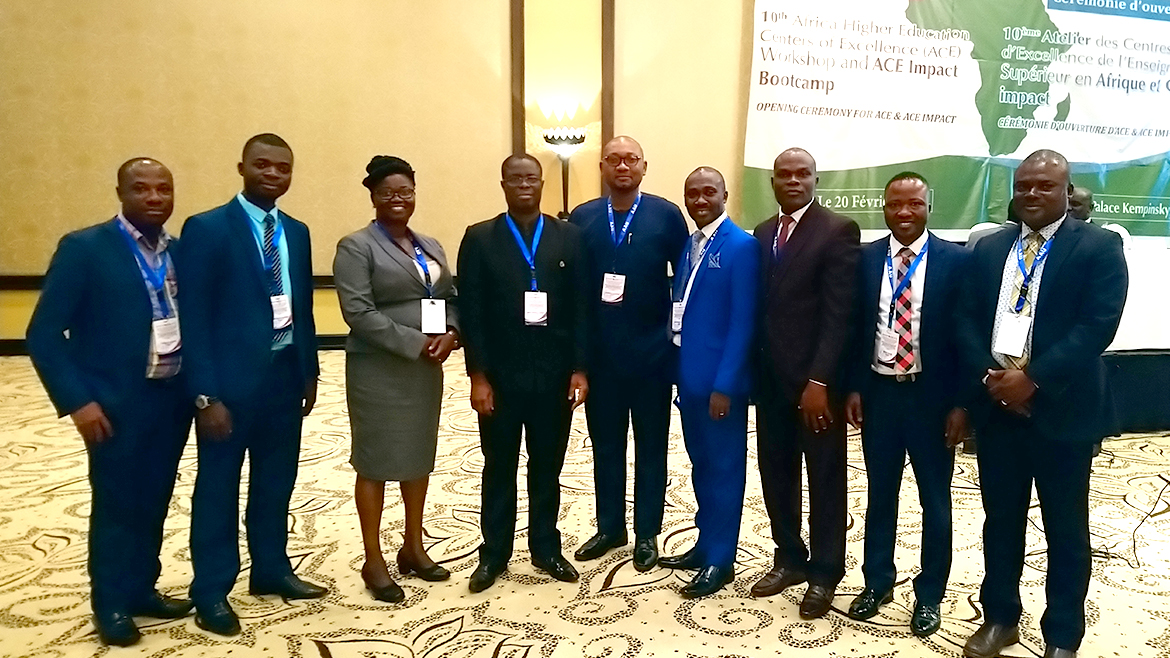Image

Posted On
Saturday, June 29, 2019 - 23:32
Body
African Centres of Excellence (ACEs) and their partners, the Association of African Universities (AAU), National Councils for Tertiary Education and other stakeholders with support from the World Bank converged last Monday 18th February, 2019 for a 10-day inaugural ACE Impact workshop and bootcamp in Djibouti with a concerted goal of strengthening research, academic and development programmes at national and continental levels. The meeting was also aimed at nurturing innovation and learning from shared experiences. The ACE participating countries include Nigeria, Ghana, Benin, Burkina Faso, Gambia, Guinea, Cote D’ivoire, Togo, Cameroon, Djibouti, Senegal, and Niger.
The meetings provided a platform for existing and new centres to obtain guidance on project preparation, exchange information on their respective programmes, and build networks and forge partnerships to ensure the successful implementation of selected projects. It also aimed to create an opportunity for the new ACEs to interact and learn from existing centres.
In September, 2018, the University of Cape Coast was competitively selected by the World Bank from among solicited proposals received from across universities in West and Central Africa to establish the Africa Centre of Excellence in Coastal Resilience (ACECoR) on its campus. The selection brings the university into a network of 44 Centres of Excellence (ACEs) in Africa approved by the World Bank to host a Regional Centre of Excellence.
The University of Cape Coast will receive a counterpart funding to the tune of US$ 6.5 million from the World Bank and Government of Ghana to implement the project. The call for proposals was rolled out by the Association of African Universities (AAU) and the Regional Facilitation Unit (RFU) of the Africa Centres of Excellence (ACE) Project, with support from the World Bank, under the ACE for Development Impact Project.
The multi-year project (2019-2023) was officially launched at the continental level among the other ACEs by H.E. Mr. Ismail Omar Guelleh, the President of the Republic of Djibouti at the 10th Africa Higher Education Centres of Excellence (ACE) Workshop and Bootcamp on 20th February, 2019 in Djibouti. The University of Cape Coast was led by the Vice-Chancellor Prof. Joseph Ghartey Ampiah. Other members of his delegation included Prof. Denis Worlanyo Aheto, the Director of the Centre; Dr. Precious Mattah, the Deputy Director; Mrs. Elizabeth Obese, the Director of Finance; Mr. Eric Agyenim-Boateng, the Project Accountant; Mr. Nicholas Ampofo Procurement Officer; and Mr. Joshua Adotey, the Project’s Monitoring and Evaluation Officer.
ACECoR will support technical capacity development of young African professionals to address issues of coastal degradation within the sub-region, as well as promote the sustainable utilization and management of marine and coastal assets in the partner countries through collaboration with academia, research institutions and industry, locally and will secure international partnerships.
Among others ACECoR will:
- establish new and relevant post-graduate programs to address the challenges of coastal degradation within the sub-region;
- provide support for the development and delivery of short courses in the areas mentioned, accredited to relevant international bodies;
- develop mentoring support systems for faculty for effective administration and management, as well as course delivery;
- provide incentives for lecturers to teach, guide research and provide in-service training to professionals in delivery of short courses;
- provide Smart Classrooms with state-of the art facilities including science laboratories with ICT equipment to promote research and deliver the trainings;
- supply computer hardware and software to deliver the course to the expected standards; and
- provide placements in industry for selected students and support lecturers to attend conferences, workshops to upgrade their skills, with fees paid through scholarships and living expenses funded by this Project
- initiate a scheme for five (5) post-doctoral fellows to be selected from within the region.
In terms of academic programmes, the Centre will admit and train 120 postgraduate students made up of thirty (30) PhD and ninety (90) masters students. The Centre will ensure strong industry linkages, encourage female participation and will facilitate an estimated 40% of total student intake into the program from within the African sub-region. ACECoR will work towards developing and securing local and international accreditation for modular academic programmes in the following areas:
- PhD/MPhil Marine and Coastal Engineering
- PhD/MPhil Forestry Engineering
- PhD/MPhil Marine Meteorology
- PhD/MPhil Physical Oceanography
- PhD/MPhil Disaster Risk Management and Migration
- PhD/MPhil Integrated Coastal Zone Management
- PhD/MPhil Fisheries Science
- PhD/MPhil Blue Economy and Social Resilience
The first batch of students are expected to be admitted in August at the beginning of the 2019/2020 academic year.
Last modified
